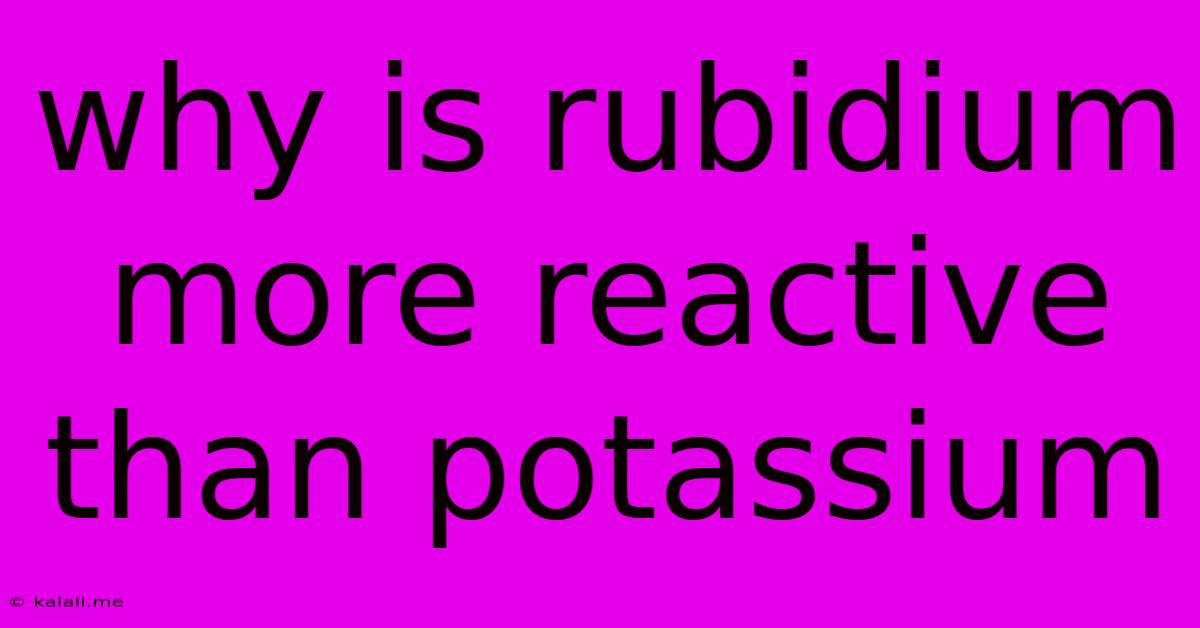Why Is Rubidium More Reactive Than Potassium
Kalali
May 19, 2025 · 3 min read

Table of Contents
Why is Rubidium More Reactive Than Potassium? Understanding Alkali Metal Reactivity
Meta Description: Discover why rubidium is more reactive than potassium. This article explores the atomic structure, ionization energy, and electronegativity differences that explain this chemical behavior. Learn about the trends in Group 1 elements and their reactivity.
Alkali metals, belonging to Group 1 of the periodic table, are known for their high reactivity. Within this group, reactivity increases as you move down the table. This means that rubidium (Rb) is more reactive than potassium (K), which in turn is more reactive than sodium (Na), and so on. But why is this the case? The answer lies in the fundamental atomic structure of these elements.
Atomic Structure and Reactivity
The key to understanding the reactivity differences lies in the electronic configuration of these atoms. Alkali metals all have one valence electron—a single electron in their outermost shell. This lone electron is relatively loosely held compared to electrons in inner shells. This makes it easy to lose this electron, forming a +1 cation. The more easily an atom loses this electron, the more reactive it is.
Ionization Energy: The Key Factor
Ionization energy is the energy required to remove an electron from a neutral atom. The lower the ionization energy, the easier it is to remove an electron, and therefore, the higher the reactivity. Rubidium has a lower ionization energy than potassium. This is because:
-
Increased Atomic Radius: As you move down Group 1, the atomic radius increases. This means the outermost electron is further from the nucleus. The weaker electrostatic attraction between the positively charged nucleus and the negatively charged valence electron in rubidium, compared to potassium, makes it easier to remove. Think of it like trying to hold onto a ball—the further away the ball is, the easier it is to let go.
-
Shielding Effect: The increased number of inner electron shells in rubidium (compared to potassium) provides greater shielding. These inner electrons partially block the positive charge of the nucleus from reaching the outer electron. This reduces the effective nuclear charge experienced by the valence electron, making it easier to remove.
Electronegativity: A Supporting Role
While ionization energy is the primary factor, electronegativity also plays a minor role. Electronegativity measures an atom's tendency to attract electrons in a chemical bond. Alkali metals have low electronegativity values, meaning they are not very good at attracting electrons. Rubidium, having a slightly lower electronegativity than potassium, is even less likely to attract electrons, further contributing to its higher reactivity.
Predicting Reactivity Trends
Understanding the relationship between atomic radius, ionization energy, shielding effect, and electronegativity allows us to predict reactivity trends within the alkali metal group and beyond. The same principles apply to other groups in the periodic table, though the magnitude of the effects might vary.
Conclusion
In summary, rubidium's higher reactivity compared to potassium stems primarily from its lower ionization energy. This lower ionization energy is a direct consequence of its larger atomic radius and increased shielding effect, which weaken the electrostatic attraction between the nucleus and the valence electron. While electronegativity also contributes, its effect is secondary to the ionization energy. The principles outlined here help explain the observed trend of increasing reactivity down Group 1 of the periodic table.
Latest Posts
Latest Posts
-
How To Fill A Deep Hole In The Wall
May 19, 2025
-
How To Remove Glue From Tiles
May 19, 2025
-
Can You Castle Out Of Check
May 19, 2025
-
Can You Bring Magnets On A Plane
May 19, 2025
-
Can You Pack Aerosols In Checked Luggage
May 19, 2025
Related Post
Thank you for visiting our website which covers about Why Is Rubidium More Reactive Than Potassium . We hope the information provided has been useful to you. Feel free to contact us if you have any questions or need further assistance. See you next time and don't miss to bookmark.